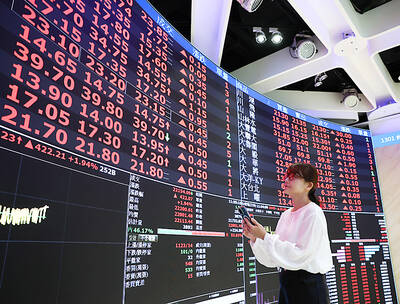Asian economies will avoid a repeat of the 1997 to 1998 currency crisis because they have accumulated large amounts of foreign reserves, Asian Development Bank (ADB) President Haruhiko Kuroda said.
“I don’t see that any countries in the Asian region are going to face such balance of payments difficulties or a currency crisis,” Kuroda said at the Foreign Correspondents Club of Japan in Tokyo yesterday.
Asian economies were crippled by a currency crisis a decade ago when Thailand’s devaluation of the baht prompted investors to pull money from the region. Several countries, including Indonesia, Thailand and South Korea, spent most of their foreign reserves to prop up their exchange rates and had to borrow more than US$100 billion from the IMF.
“I don’t think currencies in the region would be under significant pressure in the coming months or years,” Kuroda said. “I don’t think any of them would request IMF or Chiang Mai Initiative supports.”
Asian countries have accumulated foreign exchange reserves in the decade since the crisis. South Korea had US$258 billion in foreign reserves at the end of last month, the sixth highest in the world, trailing only China, Japan, Russia, India and Taiwan.
Finance ministers from 13 Asian nations, including South Korea, Japan and China, agreed in May to create a pool of at least US$80 billion in foreign exchange reserves to be tapped by nations in case they need to protect their currencies. That was an expansion of the Chiang Mai Initiative, under which pairs of nations would lend each other money at favorable terms if help is needed to support their exchange rates.
Growth in emerging Asia is “quite robust,” the ADB chief said, adding that containing inflation is the “No. 1 challenge” for the region.
Record food and energy prices are fanning inflation across Asia, leaving its consumers with less to spend and threatening growth from South Korea to the Philippines at a time when the US slowdown is weakening demand for exports.
Philippine inflation accelerated to 11.4 percent last month, the fastest pace in 14 years, the National Statistics Office reported yesterday. India’s 11.05 percent increase in wholesale prices in the first week of last month was the fastest in 13 years. Inflation in China accelerated to 8.1 percent in the first five months, the quickest since 1996.
Oil prices have doubled in the past year, while the costs of rice, corn, wheat and soybean have reached unprecedented levels this year.
Kuroda said central bankers in Asia were successfully tightening monetary policy to contain prices and would keep doing so “for some time” as inflation persists.
“I’m reasonably confident that emerging economies in the region will overcome the current inflation and go back to a sustainable growth path,” Kuroda said.

UNCERTAINTIES: Exports surged 34.1% and private investment grew 7.03% to outpace expectations in the first half, although US tariffs could stall momentum The Chung-Hua Institution for Economic Research (CIER, 中華經濟研究院) yesterday raised its GDP growth forecast to 3.05 percent this year on a robust first-half performance, but warned that US tariff threats and external uncertainty could stall momentum in the second half of the year. “The first half proved exceptionally strong, allowing room for optimism,” CIER president Lien Hsien-ming (連賢明) said. “But the growth momentum may slow moving forward due to US tariffs.” The tariff threat poses definite downside risks, although the scale of the impact remains unclear given the unpredictability of US President Donald Trump’s policies, Lien said. Despite the headwinds, Taiwan is likely

READY TO BUY: Shortly after Nvidia announced the approval, Chinese firms scrambled to order the H20 GPUs, which the company must send to the US government for approval Nvidia Corp chief executive officer Jensen Huang (黃仁勳) late on Monday said the technology giant has won approval from US President Donald Trump’s administration to sell its advanced H20 graphics processing units (GPUs) used to develop artificial intelligence (AI) to China. The news came in a company blog post late on Monday and Huang also spoke about the coup on China’s state-run China Global Television Network in remarks shown on X. “The US government has assured Nvidia that licenses will be granted, and Nvidia hopes to start deliveries soon,” the post said. “Today, I’m announcing that the US government has approved for us

The National Stabilization Fund (NSF, 國安基金) is to continue supporting local shares, as uncertainties in international politics and the economy could affect Taiwanese industries’ global deployment and corporate profits, as well as affect stock movement and investor confidence, the Ministry of Finance said in a statement yesterday. The NT$500 billion (US$17.1 billion) fund would remain active in the stock market as the US’ tariff measures have not yet been fully finalized, which would drive international capital flows and global supply chain restructuring, the ministry said after the a meeting of the fund’s steering committee. Along with ongoing geopolitical risks and an unfavorable

When Lika Megreladze was a child, life in her native western Georgian region of Guria revolved around tea. Her mother worked for decades as a scientist at the Soviet Union’s Institute of Tea and Subtropical Crops in the village of Anaseuli, Georgia, perfecting cultivation methods for a Georgian tea industry that supplied the bulk of the vast communist state’s brews. “When I was a child, this was only my mum’s workplace. Only later I realized that it was something big,” she said. Now, the institute lies abandoned. Yellowed papers are strewn around its decaying corridors, and a statue of Soviet founder Vladimir Lenin